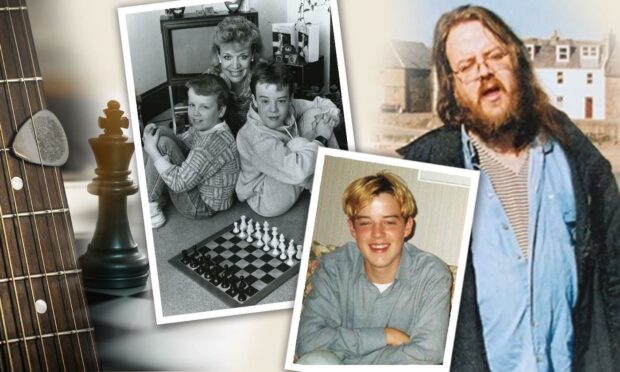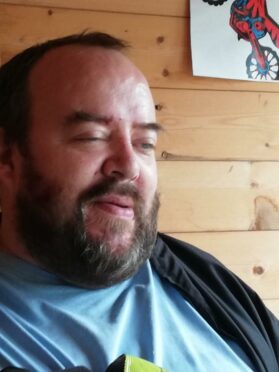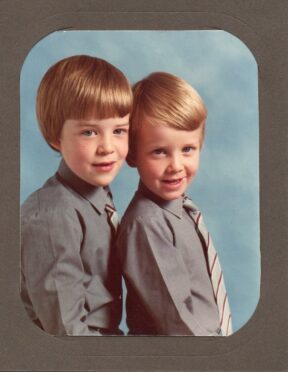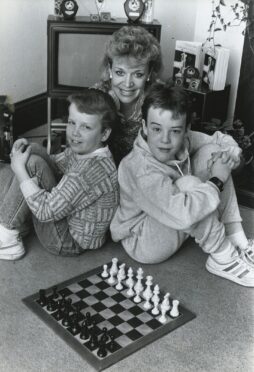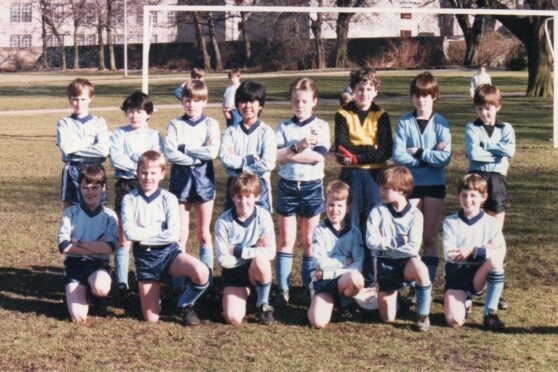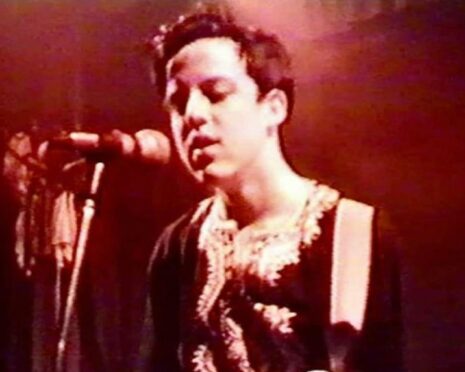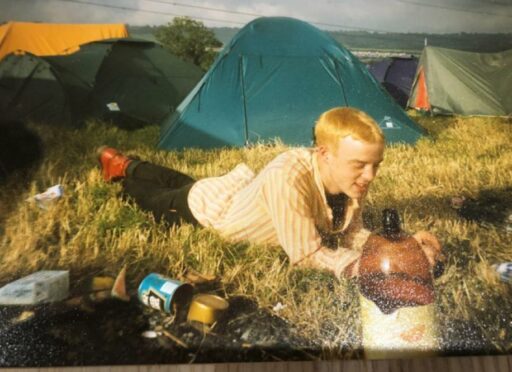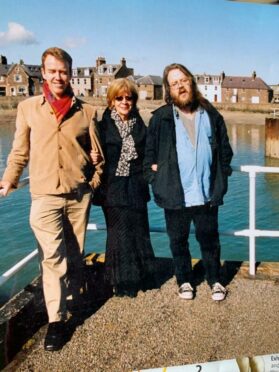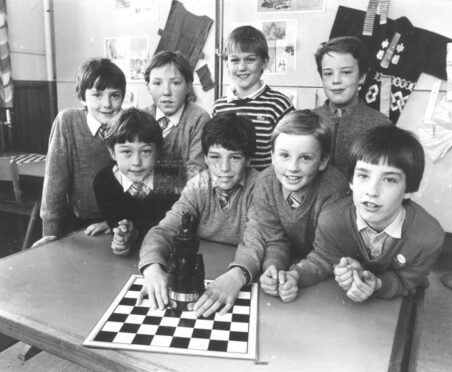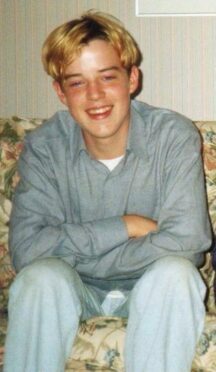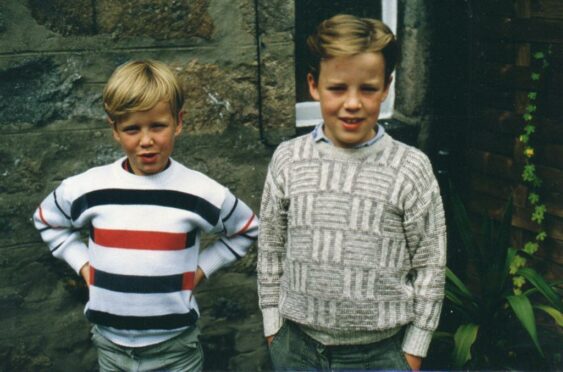As the lyrics of a Jeff Buckley song played at the funeral of 46-year-old Mark Rowson it was a poignant reminder of the life being celebrated.
Surrounded by family and friends, some who had known the aspiring musician from school days, a ‘broken Hallelujah’ went someway to capture the essence of a brilliant life, both before and after the onset of schizophrenia.
“Mark was such a joyous character. He loved life and was relentlessly positive,” said mum Lesley Owens, “but there were also many difficulties and struggles.
“Even so I didn’t think I would be losing him so young.
“Mark’s life couldn’t be labelled as simply one of suffering. He was usually positive and upbeat; he believed in himself.”
Early Years
Born on January 20, 1975 at Aberdeen’s Royal Infirmary, Mark was the older brother of Jonathan, and the son of teacher Lesley and artist Hugh T Rowson RSW.
Raised in Rosemount he attended Skene Square Primary School and Aberdeen Grammar.
A keen musician, football player and cricket enthusiast, Mark was also an accomplished chess player narrowly missing out on a place in the Scottish team.
A high performing student he studied Russian ‘just for the hell of it’, as well as Higher Music and English.
He also completed Sixth Year Studies English fuelling his love of quoting Oscar Wilde and George Bernard Shaw.
He would begin a course at Aberdeen University following a summer conversion course in philosophy.
He scored top marks on a paper proving the existence of God, something he would refer to throughout his life.
But late in his teens Mark’s behaviour began to change considerably leading to hospital admission and a diagnosis of schizophrenia.
Difficult diagnosis
Classified as a serious, long-term mental health illness it can cause a range of different psychological symptoms. In Mark’s case it meant his life being punctuated by the need for serious interventions including lengthy periods in hospital.
Jonathan said: “What struck me was that nothing about those first 18 years was abnormal.
“He played cricket, chess and football. We were always being dropped off in Duthie Park to play some sport or other. He was also a musician.”
“We moved to London for a couple of years when he was 13 years old and Mark really enjoyed the experience, and he was definitely one of the more popular people at school.”
“The family returned to Aberdeen as Mark was about to start his fourth year. A few years later, around the age of 18 his behaviour would become more erratic.
“But then when you first get a diagnosis such as schizophrenia it’s hard to pick apart the things associated with the illness and what comes later as a result of psychiatric medications and being in hospital.”
Painful hope
Having already seen the effects, within the wider family, of such serious mental health conditions Lesley describes Mark’s diagnosis as the beginning of her grieving process.
“I knew what it could mean for him, and the ways in which it could diminish his life, so in some ways I’ve been grieving for my son, for the life he should have had, for many years.
“I remember a consultant psychiatrist telling me that he believed Mark wouldn’t ‘come out of this illness’ as some do. Instead, he said – and I’ve never forgotten it – that Mark’s illness would be ‘enduring’.”
However, like many illnesses, Mark’s schizophrenia was unique to him and didn’t necessarily follow the pattern others would encounter.
“For me it wasn’t so much grief – it was painful hope,” added Jonathan.
“I grew up looking up to the person my brother was.
“He attracted people, he was larger than life, he was brilliant and truly loved the life he was living. And throughout his illness there were times when he teetered on the edge of being within reach of the life we knew he wanted.”
A moment of comfort
Mark was unable to sustain living in his own flat and over the years lived as a resident in various supported living projects in Aberdeen.
During more problematic episodes connected to his illness, Mark would sometimes be sectioned and kept in hospital.
“It’s a terribly painful thing to think about judging whether someone’s freedom should be removed,” Jonathan said.
“But they were never our judgements,” Lesley added. “The choice was removed from us for the sake of Mark’s wellbeing. He needed help.”
“He had never smoked as a very young man but it seemed to give him great peace and comfort when he was unwell,” mum Lesley added. “And it represented one of the few choices he was able to make for himself when other freedoms were removed.”
“Schizophrenia isn’t a cause of death, as such,” added Jonathan. “Mark died from having heart and lung conditions. However, those conditions arose from being mentally unwell for so long, no doubt compounded by smoking.”
Family and friendships
Throughout the years Mark loved visiting his mum and Ray’s family in Troon and his aunts, uncles and cousins in Aberdeen.
Supported by his friend Julian, he converted to Catholicism and was still in touch with school friends.
His family remain grateful that throughout the years of illness Mark received excellent professional care and support both in hospital and also in the voluntary sector.
Supported by Penumbra, SAMH and latterly VSA in Westerton Crescent, he remained passionate about music, still living with the perpetual hope that one day he would make it as a rock star.
Recording sessions – where he would want a CD, never anything digital, ranked among his favourite activities.
“The illness sort of paused Mark’s life. The hopes and dreams he had – and largely even the friends he had – were all from his adolescence around the mid 90s.
“It meant in the midst of very chaotic, even distressing circumstances, he was often happy with his thoughts, writing music and ruminating,” said Jonathan.
Fighting stigma
Mark was never resolutely resigned to his diagnosis, though he acknowledged he had struggles.
“There was – and is – such a stigma with schizophrenia and it’s hard for anyone to just accept what it means,” said Lesley
“In the early days, because I had seen it before, I found it hard to talk about it. Then I got to a place that when people asked me about my sons I would always add that Mark had schizophrenia.”
Schizophrenia is difficult to describe and varies in presentation from person to person.
It can involve a combination of hallucinations, delusions, and extremely disordered thinking and behaviour that impairs daily functioning.
Mark experienced all of these but the voices he heard would often delight him.
“He would belly laugh – so loud,” Lesley explained.
“I’d go so far as to say his moment-by-moment happiness was above average,” Jonathan added. “His inner voice was like his own life coach. He believed in himself against the odds.”
Physical health challenges
In recent years Mark’s physical health declined.
The onset of breathing difficulties brought a further diagnosis of COPD.
Coupled with increasing skin infections bouts of severe illness followed.
Lesley was informed that her son’s prognosis was poor around two years ago.
“Consultants believed he would only live for another two years such was the extent of his difficulties and that’s more or less what happened.”
“He passed away peacefully at Aberdeen Royal Infirmary on November 2nd.”
Saying Goodbye
For Mark’s family – his father Hugh, mother Lesley and her husband Ray, Jonathan and his wife and children, great comfort was found in seeing how many of Mark’s schoolfriends came to his funeral.
“It was a huge comfort to see so many friends from his youth come to his funeral, and to hear them share stories of him so vividly with love and joy.”
Lesley added: “Jonathan penned his own tribute to his older brother in which he referenced one of Mark’s favourite songs that played at the funeral: The Whole of the Moon by The Waterboys.
“He likened it to the need to see the meaning of Mark’s life as a whole, with a joyous childhood where he inspired others, and a difficult adulthood where he was looked after by others, needing to be understood together.”
A celebration of his life took place at Aberdeen Crematorium on November 11.
A slide show of his life was accompanied by a remixed song from his favourite band, The Smiths: the very apt ‘This Charming Man’.
